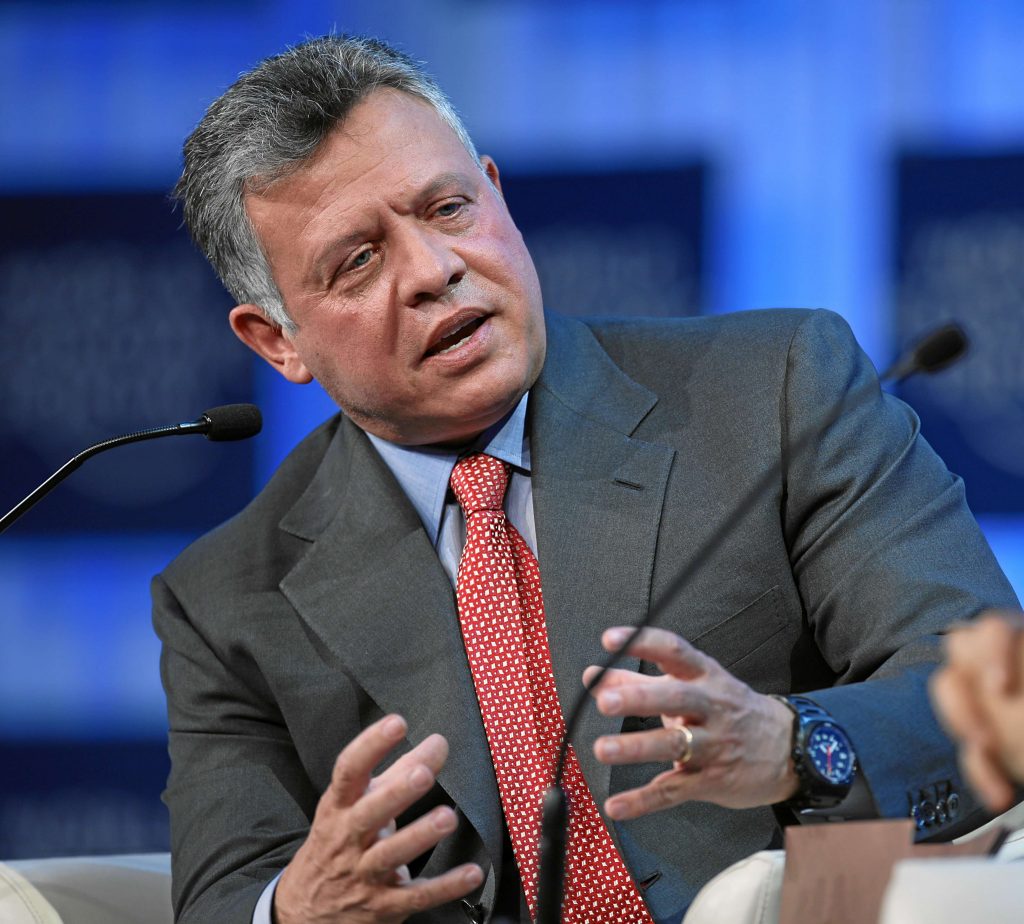King Abdullah of Jordan was at Washington National Cathedral yesterday (November 13) to receive the Templeton Prize,
From the Jordan Times:
Since its launch, the prize has been awarded to 47 international figures, including scholars, philosophers, and leading reformers, such as Mother Teresa, who received the inaugural award in 1973, the Dalai Lama (2012), and Archbishop Desmond Tutu (2013).
From Independent Catholic News:
Templeton Foundation President Heather Templeton Dill presented the Prize. She described His Majesty as “a spiritual entrepreneur, a person shaped by temporal and political responsibilities, yet one who holds the conviction that religious belief and the free expression of religion are among humankind’s most important callings.”
King Abdullah accepted the prize on behalf of all Jordanians. He reaffirmed the commitment to fight extremism, saying Islam is not about “cherry picking verses from the Koran to justify a political agenda.” He described jihad as the “internal struggle we all share to bring about peace and love,” calling on everyone to “keep up the struggle.” A portion of the £1.1 million prize funds, he said, will be used for restoration work in Jerusalem, including the Church of the Holy Sepulchre, a major pilgrimage destination for Christians.
…Woven throughout the ceremony were performances by Jordanian vocalists Zain Awad and Emanne Beasha, the Dozan wa Awtar choir, and the National Music Conservatory Orchestra of Jordan, under the direction of Talal Abu Al Ragheb. During the musical performances, videos depicted aerial views of the country’s stunning landscapes as well as teeming daily life in Amman.
The King’s work to promote peace-affirming Islam gained momentum in 2004 in the wake of the Iraq war when he launched the “Amman Message,” a description of the central elements of Islam that also called for tolerance across the Muslim world. In 2006, he supported and funded “A Common Word Between Us and You,” which led to a 2007 open letter from Islamic religious leaders to Christian religious leaders. It called for peace and harmony based on “love of God” and “love of the neighbour,” commandments shared by both faiths.
In 2010, he proposed UN World Interfaith Harmony Week with a General Assembly resolution, adding “love of God or love of the good” to “love of one’s neighbour,” thus including all people of goodwill, with or without faith. The resolution, adopted unanimously, established the first week of February as UN World Interfaith Harmony Week.
The press release, published on the Templeton Prize website:
King Abdullah II of the Hashemite Kingdom of Jordan, who has done more to seek religious harmony within Islam and between Islam and other religions than any other living political leader, was announced today as the 2018 Templeton Prize Laureate.
Known for his grace and humility, the King’s long quest to promote peace-affirming Islam gained momentum in 2004 in the wake of the Iraq war when the fragile unity of Sunni and Shi’a Muslims in the region was at substantial risk. During that period, increasingly vocal rhetoric from marginal Islamic groups threatened to create deeper schisms within the Islamic community. In the face of these challenges, the King launched the breakthrough Amman Message that articulated a clear understanding of the central elements of Islam, and affirmed that terrorism and violence have no place in the religion.
The following year, he assembled 200 scholars from 50 countries representing all schools of jurisprudence in Islam who, under his guidance, issued a declaration now known as the “Three Points of the Amman Message.” The first point recognized the validity of all eight legal schools of Islam. The second forbade declarations of apostasy (known as takfir) between Muslims, while the third established conditions for issuing fatwas, Islamic legal rulings. The Three Points have come to represent an unprecedented and almost unanimous religious and political consensus by Muslims around the globe. Since then, more than 450 Islamic scholars and institutes from more than 50 countries have endorsed it.
In 2006, King Abdullah II supported and funded the initiative known as “A Common Word Between Us and You,” which led to a 2007 open letter from Islamic religious leaders to Christian religious leaders. A Common Word contains a call for peace and harmony between Muslims and Christians based on the twin commandments shared by both faiths, namely “love of God” and “love of the neighbor.” Originally signed by 138 Muslim leaders and scholars from 52 countries, it now has more than 400 signatories including nearly 300 endorsements from a wide range of Christian leaders, and is considered by many to be the most important Muslim theological initiative towards Christians.
In 2010, he proposed the annual UN World Interfaith Harmony Week with a General Assembly resolution expanding the twin “love” commandments by adding “love of God or love of the good” to “love of one’s neighbor,” thus including all people of goodwill, with or without faith. Adopted unanimously by the General Assembly, the resolution established the first week of February as UN World Interfaith Harmony Week to stress the moral imperative of promoting and understanding the values of peace inherent in all religions. It is generally acknowledged as the first and only time that the United Nations approved a resolution explicitly citing belief in God.
Through these groundbreaking initiatives and many others, King Abdullah II has led a reclamation of Islam’s moderate theological narrative from the distortions of radicalism. But these efforts have come with great personal cost including condemnation and death threats from radical terrorist groups. As a result of Jordan’s key geographical location, his efforts have required extraordinary courage to advance cooperation within Islam and between Islam and other religions.
Image: Abdullah speaking during a session of the World Economic Forum in Davos, 25 January 2013

